The Checker Maven
The World's Most Widely Read Checkers and Draughts Publication
Bob Newell, Editor-in-Chief
Published every Saturday morning in Honolulu, Hawai`i
Noticing missing images? An explanation is here.
Checker School: Coming From Behind, Part 3

The final installment of our three-part lesson on man-down draws is a triplet. In the first two settings we'll see more ways to come from behind, while in the third setting, alas, we won't be able to pull it off.... but from this we'll learn what to try to avoid.
Ever been a man down in an endgame? Not you, right? As we've said in the other lessons in this series, it happens to everyone. Saving the draw, when possible, is an important skill to master. If you're a student, study this lesson carefully. If you're an advanced player, a review of what we take to be "obvious" can never hurt!
Let's start out with this position:
WHITE
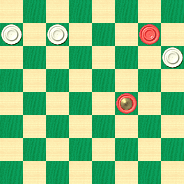
BLACK
Black to Play and Draw
Next, the famous Payne's Double Corner Draw, which should be learned by everyone who ever touches a checkerboard:
WHITE
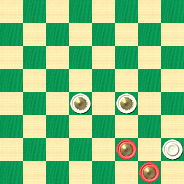
BLACK
Black to Play and Draw
And finally, a lost opportunity, to be contrasted with the very similar-looking Payne's Double Corner Draw:
WHITE
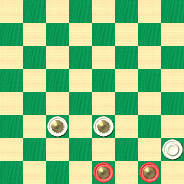
BLACK
Either to Play, White Wins
Take your time working these out, and then click on Read More for solutions, a sample game, supplementary problems, additional examples, and a host of detailed explanatory notes.![]()
The Simple Life

This past holiday season was filled with the usual hustle and bustle, and often stress triumphed over enjoyment. Many of us are a bit relieved, in fact, to return to the simpler, more ordinary days of the year.
Here's a Tom Wiswell problem, then, that seems to promise us the joy of simplicity.
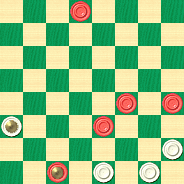
WHITE
White to Play and Draw
W:WK21,28,31,32:B2,19,20,23,K30.
White is a man down but regaining it is child's play. Has the simple life arrived, and have we solved a Wiswell problem in mere seconds?
Alas, life is not easy, and neither is this problem. Can you, without too much stress, see through to the solution, and bask in contented post-holiday enjoyment?
Don't fret. You can always click on Read More to check your answers.![]()
The New Year Rushes In

Click on a problem to display it; when you're done, click on Read More to check your solutions.
But above all, enjoy the New Year and keep on reading the weekly editions of The Checker Maven!
New Year's Eve Speedster No. 1
New Year's Eve Speedster No. 2
![]()
A Holiday Puzzler

Whatever holidays you celebrate, The Checker Maven wishes you the best of the season and hopes you enjoy this special challenger, our holiday gift to you.
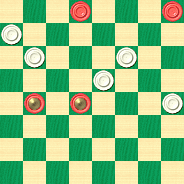
White
White to Play and Draw
W:W5,9,11,15,20:B2,4,K17,K18.
White may be a man up, but Black has two kings and a strong position. Can you provide some holiday cheer for the White side?
In the spirit of giving, here's a hint: the natural-looking 5-1 loses. Can you tell why?
Click on Read More to unwrap the solution.![]()
Pretty Complex, But ....

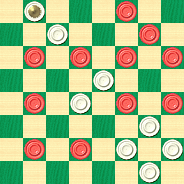
WHITE
White to Play and Win
Can you make waves with your solution, or will quantum indeterminacy hide the answer? After you've tried out the problem, click on Read More to find out.![]()
Key Landings

With the kind approval of grandmaster Richard Pask, The Checker Maven is pleased to present an electronic reissue of Mr. Pask's classic, Key Landings. Dealing with 25 especially important mid-game landings, this book is suitable for the intermediate to advanced player.
The content of the reissue is unchanged from the original 1990 publication, although the electronic edition has been completely reset with large, clear diagrams and other typographic improvements. The book is available for free download; follow the Richard Pask link in the right-hand column or just click here.
Our thanks go to Richard Pask for permission to republish this important work. Additionally, during the course of 2006, watch here for new editions of Mr. Pask's Key Themes and Key Endings.![]()
Can You Escape From The Growling Bear?
About a year ago, we presented a very difficult setting composed by Brian Hinkle, and just a few top players were able to solve it. This month, Brian has favored us with another of his offerings. It's of a very different nature than last year's, but it's a real teaser, and Brian has composed a little story to go along with it.

The amazing position shown below arose in the 40th and final game of the Go Where You Want World Title Match, played in the year 2012 at the San Francisco Checker Palace.
The match was tied 4-4 with 31 draws and the defending World Champion, Run Fora King (Black) only needed a draw to retain his title against his arch-rival Al X. Noisyev (White), better known as the "Growling Bear of Checkers" for his antics both on and off the checker board.
Early in this game, King played a gambit line in the Old 14th and The Bear responded by immediately giving back the man to obtain the best theoretical position--- at least in his view.
As the midgame progressed, the Bear offered Run a useless king in the single corner on square 29, which he accepted, being true to his name. In the late midgame, the Bear pitched a man in order to crown five White kings --- his patented "bear claw" tactic --- and place them on key squares, thus securing maximum pressure on the exposed Black pieces in the middle of the board.
Under extreme pressure and with the world title at stake, Run Fora King escaped with a draw in this difficult position, leaving the Growling Bear still hungry for the coveted and elusive GWYW World Title.
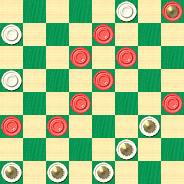
BLACK
Black to Play and Draw
B:W30,28,20,K9,K6,K4,K3,K2:BK29,26,23,22,18,15,13,12,11.
Were you able to sight solve this or did you have to move the pieces around? How long did it take you to solve it by either method?
Please send your proposed solutions and solving times to Brian Hinkle at sbhinkle@charter.net. Brian's solution and commentary will be published in the columns of The Checker Maven in the first part of 2006.
Starting with this article, we're adding FEN notation to our diagrams, at the request of our readers. If you are not familiar with FEN and PDN, a good description can be found on Wikipedia.![]()
One Year Old!
With this issue, The Checker Maven completes its first full year of publication. We're one year old today!

During our first year, we like to think we've done pretty well. Here's some of what we've been able to accomplish.
- We've gone from a handful of readers to an average weekly circulation of over 2,500, thanks to you, our loyal and valued patrons.
- We've published original problems including some of Brian Hinkle's best.
- We've published new Switcher analysis by none other than Richard Fortman.
- We've presented new electronic books by grandmaster Richard Pask.
- For better or worse, we've introduced Marvin J. Mavin and an alternate reality in which checkers is America's number one professional sport.
- We've run well over a hundred articles and maintained a reliable publication schedule.
- We've pioneered speed problems with a challenging (and unforgiving) Javascript timer.
- We've achieved a rather decent Google 'page rank' which is something completely unbiased and not subject to spin and hype.
- ... and we've done all this and much more, in a completely free, non-commercial format.
What lies ahead for The Checker Maven? Predictions are always a bit iffy, so we'll simply say that we hope to be able to continue to publish and please for a long time to come.
Jackpot

Here at The Checker Maven, we've long felt that we've "hit the jackpot" with our more than 2,500 weekly readers and the acceptance and welcome our webzine has received in its first year of publication. To celebrate, we've turned to who else but Tom Wiswell, for a nice problem which he himself has entitled Jackpot. It's not too hard (at least by Wiswell standards) but has a neat finish that you can't help but admire. The problem is co-authored by Jack Botte and looks like this:
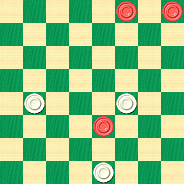
WHITE
White to Play and Win
When you've pulled the lever on your solution, click on Read More to see what Tom had to say.
[Read More]Mr. Bill Edwards: Grandmaster from Wales
The Checker Maven is pleased to present the following article about the late Welsh Grandmaster Bill Edwards. The article was written by Mr. Edwards' son, Lindus, himself a Grandmaster.
William (Bill) Edwards was born on the 28th January 1915 in the small coal-mining village of Penrhiwceiber, South Wales. At the age of twelve his father, John, taught him the rudiments of checkers, paying the youngster a penny for each elementary problem he could solve. Within a few months young Edwards accumulated a harvest of pennies and with it an interest to improve in playing strength.
At the age of fifteen his father introduced him to a local club wherein he met a dozen or so players of expert level, one of whom was the gifted crossboard player William Morgan who took the precocious youngster under his wing for several years. Morgan’s fine tuition evidently reaped a great reward when Bill, at the age of just nineteen, won the Glamorgan Open Championship without the loss of a single game in a tournament which attracted the top Welsh players of the day.
Only a few weeks after this impressive performance a serious coal-mining accident crushed Bill’s left foot causing him to be hospitalised for several months and removed him from the checker-playing scene for the next three years until he decided to enter his first Welsh Open Championship. With only a month to prepare he managed to win this prestigious event ahead of such notables as Graham Davies (later to become the British Open Champion), Alf Huggins (also later to become the British Open Champion and World Correspondence Champion), Ivor Edwards (unrelated) and Ernie Rees to name but four among many players of grandmaster strength.
Following several additional major victories Bill joined the Royal Engineers and distinguished himself by being invalided out of the army after a six-year tour of duty in World War Two.

Mr. Bill Edwards, circa 1950
With hardly any preparation Bill entered the English Open Championship in 1948 where he met and befriended the legendary Derek Oldbury. It was only in the final that Bill succumbed to the phenomenally strong crossboard player Percy Crabbe. But not without incident. This was a final now made famous by the incompetence of the time-keeper who announced that Bill needed to make eighteen moves in the two remaining minutes when, in fact, only two moves were required! Attempting to play the required number of moves in so short a time proved fatal with Crabbe capitalising upon an understandable blunder.
Following three more Welsh Championships victories between 1953 and 1955 Bill decided upon permanent retirement from the game and married shortly after.
During the winter of 1971 I discovered some old documents in the attic which revealed the illustrious checker-playing career of my father which, hitherto, he had only briefly talked about. Intrigued by his past I asked whether his interest might be rekindled to the extent of playing in another tournament, at which point he seemed dubious. Within a day or so I bought a checker board and pieces as I was desirous of seeing how skilful he was! To my astonishment I was shown an entirely different game to the one I knew as a small child and wanted, quite naturally, to learn more. Having a checker board and pieces before him for the first time in sixteen years must have served as the catalyst in his comeback, for it was only a few days later that my father and I visited Cardiff YMCA – the scene of many Welsh Championships - in pursuit of meeting the players whose skills had graced that wonderful Victorian building.
After an hour’s wait two gentlemen in their late eighties walked into the room. My father strode up to them and extended his hand as if the many years which separated their last meeting meant nothing. “Bill Edwards!” exclaimed the older of the two. “And you are my old friends Steve James and Stan Bassett,” replied my father. I looked on stupefied and said, “Now I see why checker players have to have such great memories!”
Within a couple of months of that memorable meeting my father began to study such books as ‘World Championship Checkers’ and as many others containing the games of his idol, Dr Marion Tinsley, as possible.
In May of that year my father decided to enter the British Open Championship in North Wales. By a remarkable coincidence, Graham Davies of South Wales was also making a comeback to the game after an almost equally long period.
After eleven gruelling sessions and twenty-two games Graham Davies emerged the winner of that contest with 15 wins and no losses – just ahead of my father who scored 12 wins and no losses.
A year later, and now armed with a knowledge of three-move play which, hitherto he had never studied, Bill won the Scottish Open Championship ahead of John McGill, Tom Watson, James Marshall and Jimmy Grant.
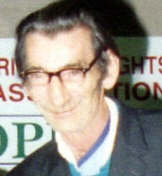
Winner of the 1987 Irish Open
Bill’s golden years were between 1979 and 1987 during which time he won five consecutive English Open Championships, together with several major freestyle tournaments.
When Bill played in the United States-United Kingdom International Match of 1989 he won seven wins out of the eleven managed by the entire UK & Ireland team. When one considers that only five wins were scored in the one hundred and eighty games played by the other nine team members, it makes one realise how strong a player my late father was. In that contest Bill scored two draws with Asa Long and beat the likes of Paul Davies, but it was at a time when he was almost at the peak of his ability.
In 1994 Bill journeyed to Scotland and won the Centenary Scottish Open Championship. Winning this event persuaded him to continue playing in spite of declining health and in 1995, at the age of eighty, he won the British Open Championship without the loss of a single game ahead of Pat McCarthy, Tom Watson and several other notable grandmasters.
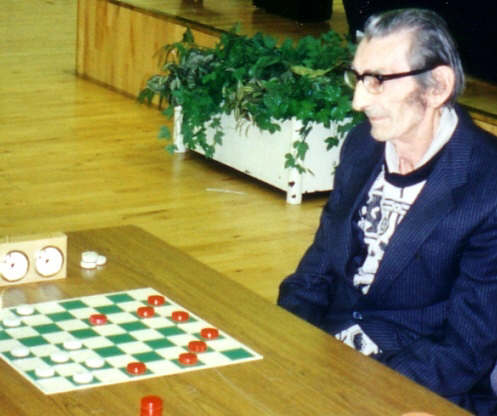
At the 1997 English Open
Following this astonishing success he decided to issue a challenge for three-move championship of the world. At the age of eighty-one and in rapidly deteriorating health Bill journeyed unaccompanied to Ireland in an ill-advised attempt to wrest the title from Ron King of Barbados. Being provided with an inadequately heated room in a sub-standard hotel, whilst Ron King enjoyed the sumptuous comfort of a five-star hotel across the road, did nothing to enhance his chances of winning the match, to say the least of the appalling toll on his health. Seeing his deterioration in health the kindly manager of the hotel at which Ron King was cordially treated in the lap of luxury took pity upon the octogenarian and insisted he stay at his hotel free of charge.
With thoughts of returning home as quickly as possible Bill Edwards, the man who had won almost thirty major championships, not surprisingly played the poorest checkers of his life.
With literally only weeks to live, in chronically poor health and suffering great pain, Bill attempted to win the Droitwich Open, which is a twelve-round freestyle event over a weekend, and was forced to withdraw after only a few sessions, but not before winning his last game with a magnificent touch so typical of his wonderful crossboard ability.
As a player my father was blessed with a phenomenal memory, often memorising dozens of games daily and retaining them for use in tournaments years later! It was not by memory alone however that he was able to defeat the finest players of Great Britain and Ireland over almost thirty years. His crossboard skills were of the highest order, often visualising twenty-five moves in the most complicated positions. I tested this ability on countless occasions, often presenting him with the most convoluted positions imaginable. The outcome was always the same.
After a couple of minutes he would say, “Yes, I can see it now. The piece on square twenty-seven will be lost in twenty-four moves!”
As a person he was liked instantly by all who met him. He exuded a calm at the checker board such as I have never seen and was a quality which undoubtedly assisted him to win a unique number of major tournaments.
Moving a piece on a checker board was something he did with an elegant style and was sheer poetry in motion to behold. Always modest in success and congratulatory to the few who beat him Bill will be remembered not only as the greatest Welsh player to date, but as a person with a big heart who loved everyone.
William “Bill” Edwards died peacefully at Prince Charles Hospital, Merthyr Tydfil, South Wales, during the early hours of Thursday the 23rd July 1998 aged eighty-four years.
Only hours before his passing he asked me how the British Open Championship was progressing–- an indisputable testimony to his deep love of checkers. Pat McCarthy was to later write to me saying, “Your father’s play had a touch of genius about it.” Coming from a player my father regarded as a phenomenal crossboard player this was a fine eulogy indeed.
---Lindus John Edwards.

Penrhiwceiber, Village of Mr. Edwards' Birth
Here is a game played by Mr. Edwards in the 1982 British Championships in which he defeats the legendary Derek Oldbury. Annotations are by Lindus Edwards.
1982 British Championship Match
Edwards: Black
Oldbury: White
| 10-15 | 24-20 |
| 7-10 | 28-24 |
| 3-7 | 23-19 |
| 9-14 | 22-17 |
| 5-9 | 17-13 |
| 15-18 | 26-23 |
| 1-5 | 31-26 |
| 11-16 | 20-11 |
| 8-15 | 26-22 |
| 4-8 | 21-17---A |
| 14-21 | 23-14 |
| 10-26 | 19-3---B |
| 9-14 | 30-23 |
| 21-30 | 32-28 |
| 8-11 | 23-19?---C |
| 11-16 | 19-15 |
| 16-20 | 15-11 |
| 14-18 | 3-8 |
| 6-9 | 13-6 |
| 2-9 | 11-7 |
| 30-26 | 8-11 |
| 26-23 | 7-2 |
| 23-32 | 11-15 |
| 20-27 | 15-22---D |
| 27-31 | 2-6 |
| 9-13 | 29-25 |
| 32-27 | 6-10 |
| 27-23 | 25-21 |
| 12-16 | 10-14 |
| 16-19 | 14-10 |
| 23-27 | 10-7 |
| 19-23---E | Black Wins |
A---Or 22-17 as played by Newell Banks vs. Marion Tinsley as follows: 8-11, 25-22, 18-25, 29-22, 11-16, 22-18, 15-22, 19-15, 10-28, then either 17-1 (Tinsley-Banks) or 17-3 (Tinsley-Hellman).
B---19-1 is the better way.
C---This permits 11-16 and places the piece on 27 in jeopardy. Instead, 24-20 11-15, 27-24, 30-26, 23-19, 6-10, 29-25 Drawn. D. E. Oldbury vs. E. Frazier, 1965 match.
D---"There are other man-down ideas that might have been tried, but to no avail" (DEO).
E---A nicely played win.![]()
The Checker Maven is produced at editorial offices in Honolulu, Hawai`i, as a completely non-commercial public service from which no profit is obtained or sought. Original material is Copyright © 2004-2025 Avi Gobbler Publishing. Other material is public domain, as attributed, or licensed under Creative Commons. Information presented on this site is offered as-is, at no cost, and bears no express or implied warranty as to accuracy or usability. You agree that you use such information entirely at your own risk. No liabilities of any kind under any legal theory whatsoever are accepted. The Checker Maven is dedicated to the memory of Mr. Bob Newell, Sr.

